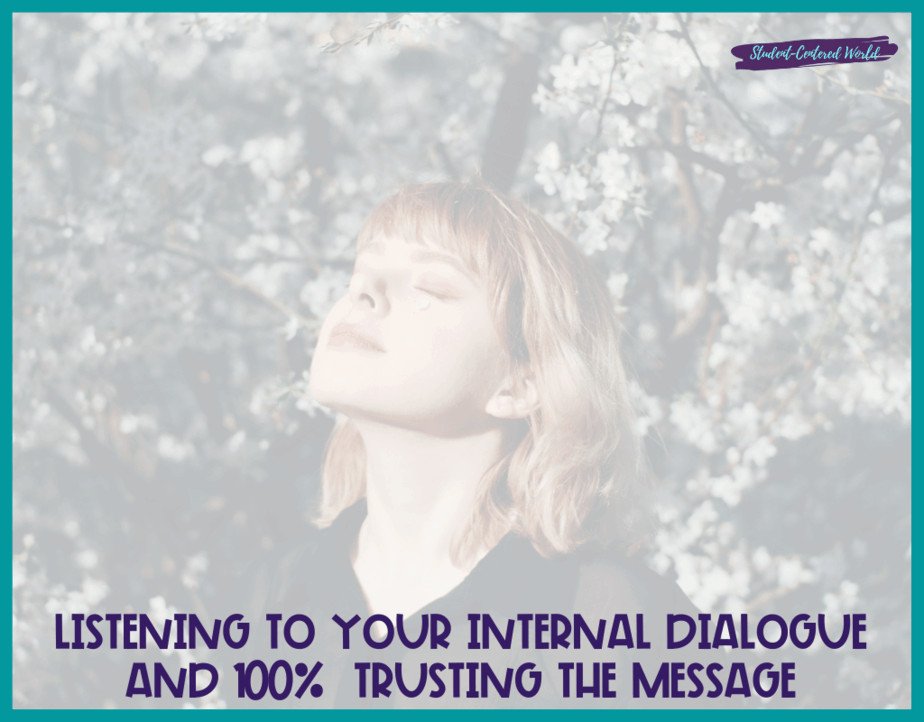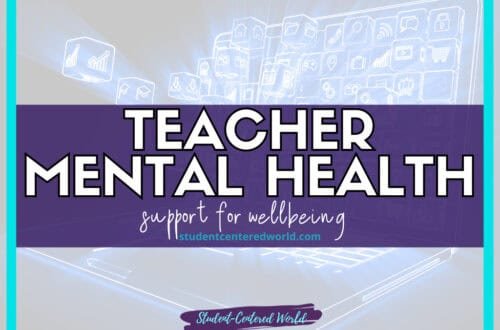Listening to your Internal Dialogue and 100% Trusting the Message
How many times have you been affected by somebody who has said something to you either in person or on social media that went against what you thought was the right thing? Somewhere along the line, it no longer became okay to have a friendly debate with someone who thinks differently than you.
It must be black and white, right or wrong, and we see this all the time now.
These external voices start making your internal dialouge question itself and that’s not okay. There is no wrong in the classroom when your heart and your head are thinking about what is in the best interest of your students.
Obviously, common sense is a factor and of course, there are rules that we need to stick to, but if you’re making decisions based on what is best for your classroom, it isn’t wrong.
Somewhere along the way, we turned into a society where it’s acceptable to say the meanest thought that you had if you had the opportunity to hide behind a computer screen or behind a phone screen. I don’t think that’s beneficial to anyone’s mental health.
If you feel the need to disagree with somebody…and we’re human beings were supposed to be able to disagree with one another…you need to be able to do so in a respectful manner. Intensely going at someone and telling them that they do things is wrong without having a dialogue about it it’s just not appropriate.
It doesn’t matter what works in somebody else’s classroom if what you’re doing is working in your classroom and it’s in the best interest of your students. Sure, you can take ideas and suggestions from others and of course, you can listen to other people’s viewpoints. but that doesn’t mean what you’re doing is wrong.
We need to start doing a better job at lifting one another up. The concept of the negativity of the teachers’ room has always been something of a bit of a joke in the teaching circle. We know that some people go into the break room to vent.
It’s normal, human nature and you have to get it off your chest sometimes.
I don’t think there’s anything wrong with that, especially when you’re in a place where you know other people understand your predicament you’re talking about, but when you have people who go back at what you’re saying in a negative light and aren’t trying to find ways to help you remedy the situation, that’s where we start having issues.
We have these external voices who may be colleagues or parents or administrators or even our friends and family, but their negativity has us start doubting ourselves and our abilities in the classroom. If you’re like so many of us, it’s refreshing to hear nice things, but the negative comments allow your mind to wander to places it should not go.
We’re in a really tough time in education right now and we should be surrounded by external voices that help lift us up instead of adding fuel to this negative fire that really needs to be put out.
The fact of the matter is that this is the society that we live in now. People post whatever they want to post on the internet and the negative is starting to outweigh the positive. We stopped remembering the saying we all learned his kids…
“If you don’t have anything nice to say, don’t say anything at all”
…and that’s part of the problem.
People shouldn’t be afraid to voice an opposing viewpoint if they do so factually and respectfully. It’s time that we stop saying it’s okay to be attacked for having different viewpoints. We are literally all in this together we’re all teachers because we want to help our students excel.
By going at one another were doing the exact opposite of that.
I get that this all sounds really nice in theory, but it’s difficult to shake off because these people exist all around us. What can we do as individuals? Again, you can’t control what other people do and what other people say or what other people think. The only thing that you could truly control is yourself, but some people have thicker skin than others.
If you’re a person that doesn’t just let it roll off your back, it could really start weighing on you mentally.
We’re always talking about the support that our students need; well what about the support that we need? Why is that support missing? What can we do to help keep ourselves up?
I recently talked about an activity where you sit down and you start writing out your internal dialogue to help clear your mind. When you’re in the moment of feeling sad or angry or frustrated, this activity is a great first step in organizing your internal dialogue and making it so it’s not overwhelming you. Sometimes even the smallest thing that’s under our skin can become a huge deal.
If we can pinpoint those triggers and we can help pull ourselves up and move forward, it will change the balance of stress in our lives.

Is It Easier Said than Done?
So how do we do that? It’s a matter of trying to figure out what you can do to make the situation better for you. Do you have to rethink how you approach a particular situation? Do you have to limit your interactions with certain people?
For example, if a person always has something negative to say, of course, you could just not have conversations with that person anymore (if you can help it).
I had one particular coworker that used to come to me often to talk about student-centered learning and how they could incorporate that into their own classroom. I would spend a lot of time sitting down with this person and trying to explain the different concepts and ideas that they could easily do.
Every single time I tried, the response back to me was some type of negative thought along the lines of, “it wouldn’t work” or “it’s too much to get it all together”. At the end of the day, I was doing my best to help this colleague, but they didn’t want to help themselves and they were trying to bring me down with them.
I will never turn someone away if they come to ask me for help…not a colleague, not a family member, not a student. My administration was very aware that I would stop and help a student at any time they walked through my door. At the same time, I had to take this particular situation into consideration for future conversations.
My time is valuable and if you’re going to come to me and tell me I’m wrong every time I’m trying to help you, then I’m not going to give you suggestions anymore.
It was hard for me because I’m a natural helper; I want to help people. I want people who look at my classroom and want theirs to be the same way to make that happen, but at the same time, I have to look out for myself.
We only have so many hours in a day. We only have so much brain capacity for what we need to do. If you’re a helper like me, you certainly want to help others the best you can, but know that you can’t save everybody.
There are going to be people who disagree with you and even though sometimes that’s a tough pill to swallow, it’s not your problem if somebody doesn’t want to listen or somebody wants to look at the glass is half empty.
It’s okay to be frustrated sometimes; that’s normal and it’s okay to have happened, but how you deal with it personally is more important than how the people around you are dealing with it. Let your inner voices stay positive and stop listening to the negative external forces.
Just remember, we’re all doing the best that we can. There are always going to be people out there that are trying to drag others down with them; I don’t understand why that is and maybe one day we can find a way to help raise them back up with us as opposed to having them drag us down.
At the end of the day, we all have to make sure that we are doing what is best for us. I know we always talk about what’s best for our students and their well-being and what needs to go on in our classrooms that’s obviously our number one concern as teachers, but we also have to make sure you step back and take care of YOU.

Why Your Internal Dialouge Matters
With so many external voices coming at us and ultimately making us question our gut feelings, it is beyond important to listen to what our internal dialouge is actually saying to us. That internal dialogue is what we know to be true in our innermost minds, but so often it is swayed and we are actually tricked into thinking that our gut instincts are wrong.
In this day in age, it is absolutely crucial that we listen to that internal dialouge to keep ourselves healthy and sane. We need to focus on what it is telling us, and stop listening to the external voices who are trying to trick us into thinking that we are less than who we truly are.
I know this may sound a bit overdramatic, but I want you all to understand just how important our gut feelings really are. We can never go wrong by having faith in what our hearts, minds, and internal dialogue are telling us.
Our gut feelings will always be right because we already know the truth about ourselves, even though sometimes we try to fool or bypass that fact. We all know deep down what is actually true for our very being. It’s so important to remember this on a day-to-day basis.
We need to stop listening to those projects that society tells us we should aim for. We must stop listening to the external voices that “you’re not good enough”. We need to develop a strong sense of self-worth and understand why it is important for us to continue believing in ourselves and knowing that our internal dialouge has our back even when things get tough because they will get tough.
The only voice that we need to be listening to is the one inside of us because that will never fail or let us down. That’s why it is so crucial for us to keep developing and cultivating a stronger relationship with ourselves so we can internalize the messages we know to be true about ourselves but somehow manage to trick ourselves into believing they are false.
I hope this helps you understand why it is so important to listen to your internal dialouge, even though you may sometimes think that voice might be wrong. Remember no matter what, our gut feeling is always right because it is the truth of who we are as individuals. Keep developing a stronger relationship with yourself and know that your voice is always right.
Toxic Positivity vs. Positive Mindset
Below is the transcript for the Student-Centered World Podcast Episode 44: “Toxic Positivity vs. Positive Mindset”
Toxic positivity. It’s a buzzword today but what does it actually mean? Toxic positivity is when you overly look at the bright side of life. It’s when you are not acknowledging anything difficult and you are trying to find the best in everything, but to a fault to the point of making some people feel bad about the negative things that are happening in their life. Today, I want to chat about that for a little bit.
Welcome to the Student-Centered World podcast where we talk about all things hands-on teaching and keeping your energy and sanity in the classroom. This teacher turned consultant is making it her mission to help as many teachers as possible become the best version of themselves and keep their passion for teaching on fire. It’s her hope that we never forget why we desire to have a passion for educational progress. This is Student-Centered World, and this is Jenn Breisacher.
So hello, I hope you guys had a great week, and that you have some good stuff planned for today. But I really thought it would be doing a disservice to everybody who listens in to not bring up this topic. So, you see this on social media a lot. People that call other people out for what they’re calling toxic positivity, which is not acknowledging the suck, which is how I like to put it.
You know that I am always saying that we need to find the silver linings, that during COVID, there has been a lot of good that has come out of it with advancements to education and conversations that are happening in the mainstream and so on and so forth. We need to listen to our internal dialouge telling us the way.
But if you’ve been listening to me for a while, you know that even though I say that these good things are coming, that you can find good things, that there’s brightness every time that there is darkness. I acknowledge the darkness and that is the difference. A lot of times these people who have this toxic positivity are trying to say that you can pull through every bad situation and that there’s always an upside and there’s always a positive outlook which might not necessarily be incorrect.
But they’re not acknowledging that there could be trauma or there could be something that is just out of a person’s control that is really, really negative. That there are just bad things that are happening.
Take somebody who is going through a really tough time, whether it be just from something personal in their life, or through COVID, or a really tough group of students with a tough school year. It is making it so their concerns and their stressors and their sadness and their anger aren’t supposed to be justified.
I wanted to take time today to talk about that because I think there is in fact always a bright side that can be found, there’s always a silver lining, even if it is the smallest drop of water in the middle of the ocean. There’s always something that you can look at on the bright side.
There is always good. Mr. Rogers saying of when something bad happens always look for helpers. It’s kind of that concept. But I think it’s also really important to acknowledge when things are not going so well or what is causing you to have to try to find that silver lining. I think that is the line between being optimistic and being understanding and trying to help someone through a tough time.
That someone could be yourself and this idea of toxic positivity, which is just let’s ignore the bad and focus on the good. Let’s focus on the benefits. Let’s focus on the growth and the help and not focus on the negative. I know a lot of people… It’s almost like a pendulum; we’ve swung to this other side where people don’t want others to harp on the negative.
They don’t want you to wind up falling into this pit of negativity and always being that teacher in the break room that has nothing good to say. I think these people that have kind of focused more on this like toxic positivity mindset are trying to say don’t harp on the bad, let’s try to find the good.
While there is merit in that at times, that’s also taking even like a student who was having a rough time and basically telling them like the hard stuff doesn’t matter because the good stuff is there. The hard stuff does matter but that is what’s bringing out the good pieces. When you’re in the middle of a really dark moment, it’s hard to see the light.
Sometimes it’s nice to have somebody guide you to that and say listen, there are perks, there are a little peeks of sunshine coming through here to help someone realize that it isn’t all negative.
By negating the negative, you’re now saying that the emotions of sadness and anger or fear or distrust, or distraught, or burnout don’t matter, or aren’t relevant, or aren’t as important as trying to find these little minute pieces of good in a situation.
So, as I said, that’s like a pendulum that is the opposite end, which doesn’t benefit very many people. So, if you are a glass is a half-full type person, or if you are listening to those that are a glass-half-full type of person, you need to make sure that both sides are being acknowledged. But I also think it’s important to talk about this because I think the way that we work as a society is, as the pendulum swings back and forth, people adapt to what the social norms are.

I don’t want to start seeing people that stopped being positive, that stop being that glass is half-full, and let’s try to find a way and let’s see what the good is in this situation, and what can come from it.
So, I think the best way for us all to make sure that that doesn’t happen is to be mindful of the fact that bad things happen. Sometimes good things come from those bad things. But it’s important to acknowledge that you’re allowed to have feelings about the bad things.
Sometimes those bad things last longer than others and it takes longer to be able to see the good points or to be able to accept the good points or feel that you are worthy of the good points.
It’s a balancing act. But this idea of toxic positivity is very real and it’s very alive in our society right now. But I don’t want people to stop being positive, especially in the classroom. It’s just important that you recognize the bad when it comes with the good.
So, if you’re helping a student through a situation, making sure that they understand that they are justified in negative feelings before trying to show them positive ones, is a really big piece, and having everybody be able to grow from an experience and move forward from it. So, I hope that makes sense. I just really felt the need to chat a little bit about that today, my thoughts on that.
I’ve seen a lot of other people that have been trying to articulate those same thoughts, which is one of the reasons why I wanted to put it out on the podcast for people to listen to and think about and digest a little bit. If you have thoughts about that, you can always feel free to reach out. I’m always willing to talk to everybody, but moving towards another week, I just want you to be mindful of the good, the bad, the ugly, and drawing all that.
If you are typically like a Debbie Downer, maybe this can help you move to another side of that a little bit, or if you are somebody that’s always trying to be the joy from inside out. Always make sure that you acknowledge that the sadness is always necessary or the disgust or the fear or the anger just because I’m in a Pixar theme right now. But take that with you, take it for what it’s worth.
If you do see this toxic positivity, feel free to chat with somebody about it and just say it’s important to acknowledge the other side of it too before trying to help somebody move towards the positive. So, I hope that makes sense. I hope that you found that helpful and that you do have a great weekend, that you do have a good week coming up.
Stop Driving the Teacher Struggle Bus
Are you struggling with student engagement, apathy, or keeping your class on track?
💫💫 There’s hope! 💫💫
Join my free teacher workshop “Choosing Choice” and in just 60 minutes, you’ll craft a practical plan to revitalize your teaching. Discover the magic of student choice in boosting engagement, gain quick implementation ideas, and explore strategies for year-long success.
Unlike overwhelming workshops, my approach guides you in real-time, providing more classroom options, reducing stress, and giving you more personal time.
Plus, you’ll earn a 1-hour professional development certificate and have 7 days of access.
Don’t miss this chance to transform your teaching; click below to secure your spot now!






